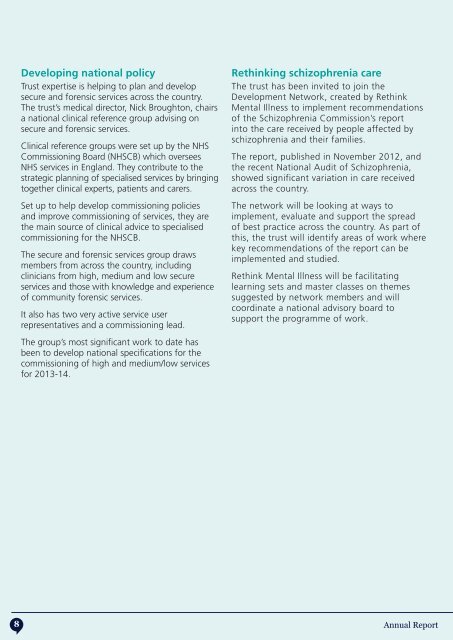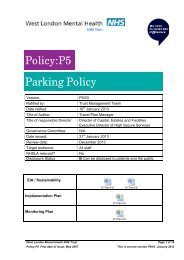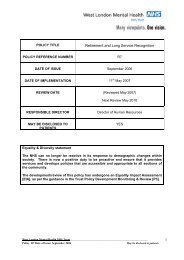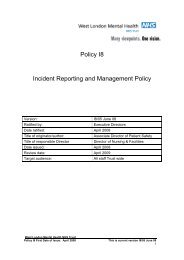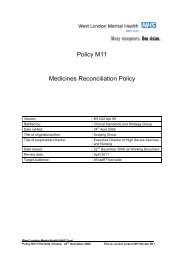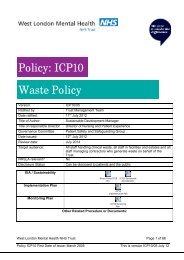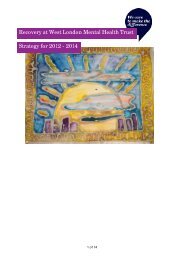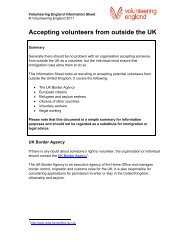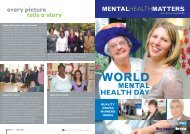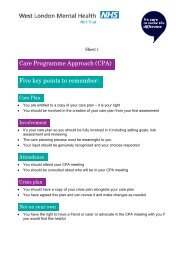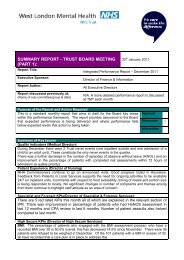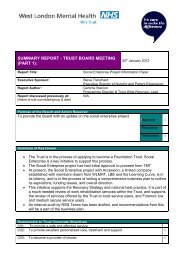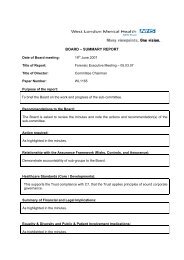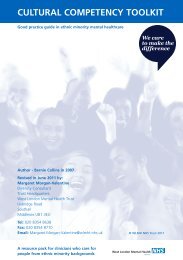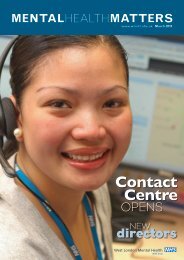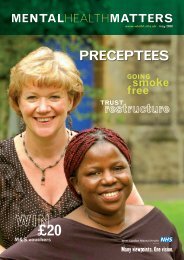Annual report 2012-13 - West London Mental Health NHS Trust
Annual report 2012-13 - West London Mental Health NHS Trust
Annual report 2012-13 - West London Mental Health NHS Trust
Create successful ePaper yourself
Turn your PDF publications into a flip-book with our unique Google optimized e-Paper software.
Developing national policy<strong>Trust</strong> expertise is helping to plan and developsecure and forensic services across the country.The trust’s medical director, Nick Broughton, chairsa national clinical reference group advising onsecure and forensic services.Clinical reference groups were set up by the <strong>NHS</strong>Commissioning Board (<strong>NHS</strong>CB) which oversees<strong>NHS</strong> services in England. They contribute to thestrategic planning of specialised services by bringingtogether clinical experts, patients and carers.Set up to help develop commissioning policiesand improve commissioning of services, they arethe main source of clinical advice to specialisedcommissioning for the <strong>NHS</strong>CB.The secure and forensic services group drawsmembers from across the country, includingclinicians from high, medium and low secureservices and those with knowledge and experienceof community forensic services.It also has two very active service userrepresentatives and a commissioning lead.The group’s most significant work to date hasbeen to develop national specifications for thecommissioning of high and medium/low servicesfor 20<strong>13</strong>-14.Rethinking schizophrenia careThe trust has been invited to join theDevelopment Network, created by Rethink<strong>Mental</strong> Illness to implement recommendationsof the Schizophrenia Commission’s <strong>report</strong>into the care received by people affected byschizophrenia and their families.The <strong>report</strong>, published in November <strong>2012</strong>, andthe recent National Audit of Schizophrenia,showed significant variation in care receivedacross the country.The network will be looking at ways toimplement, evaluate and support the spreadof best practice across the country. As part ofthis, the trust will identify areas of work wherekey recommendations of the <strong>report</strong> can beimplemented and studied.Rethink <strong>Mental</strong> Illness will be facilitatinglearning sets and master classes on themessuggested by network members and willcoordinate a national advisory board tosupport the programme of work.Focussing on recoveryStrategic aim: excellent personalised care and treatmentRecovery is the defining principle of everything we do. This meanswe have been moving from a model of care where we ‘look after’people to one where we work with patients to manage theirsymptoms and improve their health. We are working hard toembed this principle of recovery into everything we do.Patient-centred careThe trust was chosen two years ago as a pilot sitefor a national recovery initiative ImplementingRecovery for Organisational Change (IMROC), whichenabled us to benefit from expert advice and sharegood practice with trusts around the country. Theresult was a huge burst of energy and enthusiasmamong staff for the recovery ethos and we havebeen building on that with a range of initiativesdesigned to embed recovery into every service.Recovery conferences, such as west <strong>London</strong>forensic service’s conference in January, whichbrought together staff and service users to talkabout the importance of personal stories insupporting recovery.‘It’s Possible’, is an inspiring collection of artwork,poetry and personal accounts contributed bypeople who have used our forensic services, givento people newly admitted to the forensic service tohelp and encourage them.Broadmoor’s recovery college, where patients andstaff attend recovery learning sessions together,helping to break down barriers and give a sharedunderstanding of what recovery means.Recovery hubThe recovery hub was developed by the trust toprovide a variety of resources to staff, service usersand carers to assist them in their personal recoveryjourneys or with supporting others.The aim is to give people the tools and skills tobecome architects of their own recovery journeys.A large part of this process is encouraging andempowering people to take control of theirown lives and allowing individuals to take upopportunities that will support their recovery.All of the hub courses are jointly designed andrun by service users, carers, and staff. Theycover topics such as an introduction to recovery,disclosing mental health problems at work andbuilding confidence.“Today’s learning has given me more knowledgeand hope for my recovery journey,” said oneservice user after the course. A carer said: “It willhelp me to care for my son.”“Today’s learning has given memore knowledge and hopefor my recovery journey.Service user“8<strong>Annual</strong> Report <strong>2012</strong>/20<strong>13</strong>9


